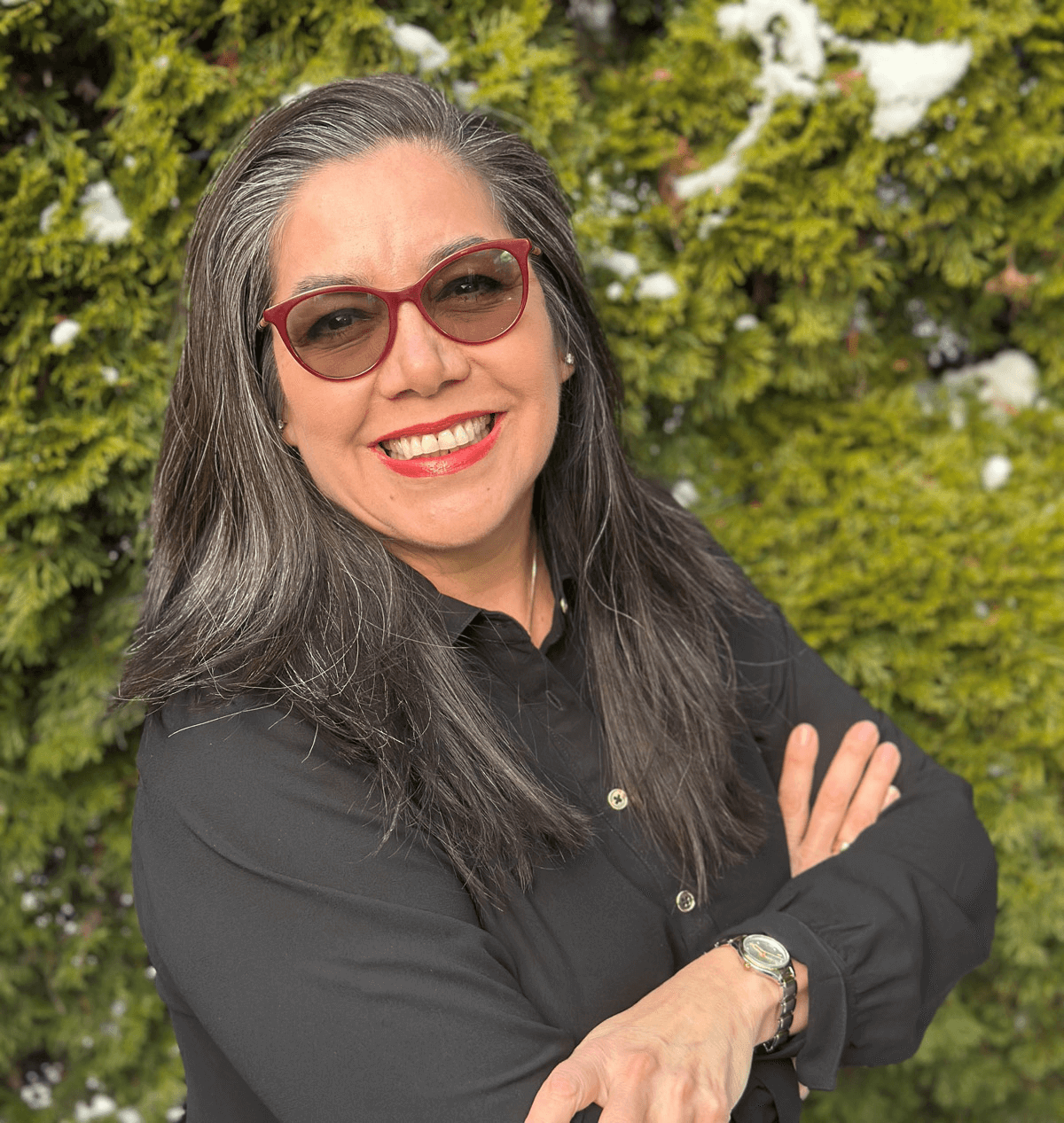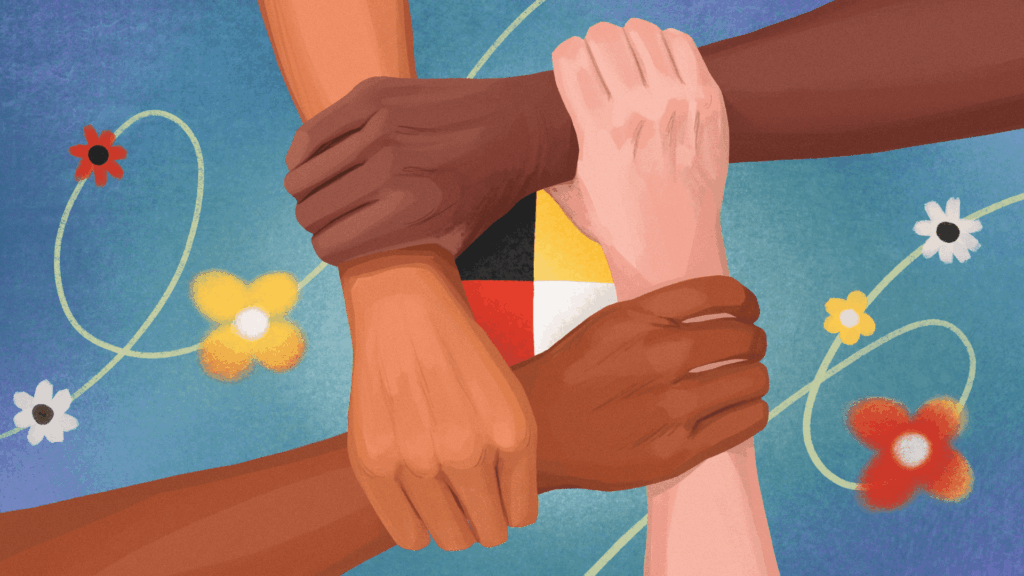In Monica McAlduff, the First Nations Health Authority (FNHA) has found a leader whose personal journey mirrors the transformation they seek to create. The MHCC sat down to learn more about the new CEO, her vision for the organization’s next chapter, and her commitment to walking in a good way.
Home, at last
After nearly three decades serving within a system that gladly received her care, but never made her feel entirely welcome, Monica McAlduff is home at last.
As the incoming CEO of the First Nations Health Authority (FNHA), Monica’s quiet conviction shines through the screen during our virtual meeting.
“Culturally safe, patient-centered care is the beating heart of our organization’s mission,” she explains, her words carrying the weight of both professional expertise and lived experience.
For Monica, assuming leadership of the FNHA represents a milestone in a career carved with careful intentionality. Beginning with clinical psychiatric nursing, then pursuing advanced degrees and leadership, Monica understands intrinsically that First Nations patients can’t get well in an unhealthy system.
“As nurses, we may not naturally gravitate to leadership, because our instinct is to give care,” says Monica. Yet, it’s this person-first worldview that is often lacking at the highest levels of conventional health-care administration.
“As a nurse working with people living with substance use or mental health challenges, day- in, day-out, I saw how supporting someone in their wellness journey required treating the whole person – and understanding the context of their environment and relationships,” explains Monica.
It’s this philosophy, together with her unwavering belief in Indigenous resiliency, that she now brings to the challenges that lie ahead.
Rooted in care
Monica comes by her heart to serve honestly.
Her mother, a residential school survivor, worked as a nurses’ aide while instilling in Monica the values of hard work and integrity.
“My mother lives by the motto: if you’re going to do something, put your whole heart in it,” Monica says, her expression lighting up. “She never speaks a harsh word. When confronted with racism or hatred she rises above it. When I was growing up, she was determined that her past would not dictate her future, or the future of her family.”
As a second-generation residential school survivor, Monica understands intergenerational trauma from the inside out. She speaks candidly about still piecing together parts of her past that her grandparents felt best left buried until fairly recently.
This personal connection to colonization’s lasting harms shapes Monica’s approach to healing systems deeply scarred by historical trauma.

Walking between worlds
When I ask Monica about her early experiences as a psychiatric nurse, she becomes visibly emotional, wiping away tears from beneath her black-framed glasses. She describes seeing Indigenous patients being treated with disdain and disregard, and how she felt obliged to hold her own identity close, for fear of being discounted by her peers.
When I instinctively apologize for broaching this raw topic, she graciously responds: “In our culture, tears are healing. They aren’t something to hide.”
This duality – vulnerability alongside strength – defines her leadership approach.
“I worked in a system where I was forced to hide my own identity – something that, by rights, I felt deeply proud of,” she explains. “How could I provide authentic care while denying my authentic self?”
With racism and discrimination baked into the very bones of the healthcare system, healthcare workers who feel pressure to conceal or supress an essential part of their being can quickly find their identity eroding and their well of compassion running dry.
Seeking to resolve this contradiction would forge Monica’s life’s work.
That’s why today, she feels compelled to be as visible as possible, making the path easier for those coming behind.
“This role is more than a job for me,” Monica reflects.
It’s a way for her to honour her younger self. To smooth the path for others – regardless of what identity they may struggle to honour. And to rewrite the future.
Restoring faith in medicine’s highest calling: Do no harm
The ground-breaking cultural humility framework that FNHA has developed identifies and addresses inequities, creates cultural humility, respects knowledge holders, and walks alongside communities to address their needs.
The goal, says Monica eloquently, “is to plant a seed, and grow a meadow.”
And while she agrees there’s been collective progress, citing the United Nations Declaration on the Rights of Indigenous Peoples, the Truth and Reconciliation Commission’s 94 Calls to Action, and British Columbia’s provincial In Plain Sight Report, her focus is squarely on the work ahead.
“People are still dying in health-care settings because of bias and racism. No matter how stretched the system may be, and how hard people may be working within it, this is patently unacceptable.”
That said, Monica cautions that any standard – no matter how thoughtfully designed – is only as effective as its implementation.
“Checkbox exercises aren’t going to result in meaningful change,” she says. The FNHA itself underwent an assessment against the framework, because bias can seep through even the most stalwart bulwarks.
“What will signal progress is patient evaluation. When you hear from an Indigenous person that they felt seen and cared for, that’s the true litmus test.”
She says that will happen only when patients’ wisdom and expertise in their own healing journey are respected and supported, and the system is culturally safe for those providing care.
Ultimately, Monica believes that system-wide implementation of the framework will benefit everyone who walks through the doors, regardless of their background. But the imbalance faced by First Nations individuals seeking care is always at the fore of FNHA’s work.
A holistic approach
The First Nations Health Council – a provincial-level advocacy organization that represents, and is accountable to, First Nations in British Columbia, has developed a ten-year strategy addressing the social determinants of health. It recognizes that the “system” itself is a constellation of schools, water, land, healthcare, housing, family, community and culture.
“As the organization tasked with leading the implementation of this strategy, we at FNHA understand that health can’t be addressed in isolation,” she explains. “The same colonial systems that disrupted our health practices also disrupted our relationships with land, water, language, and each other.”
And when it comes to embedding First Nations ways of knowing and respecting cultural tradition across health-care systems more generally, Monica says the time for excuse-making is over.
“In our culture, it’s relational. Everything is based on relationships,” she explains. “Start with the basics. What territory are you on? What communities are nearby? Who am I? Who are you? How can we co-create together?”
Wholehearted leadership
As our time ends, Monica returns to her mother’s wisdom: “Lead with heart, or leave it to someone else.” For her, leading the FNHA represents the culmination of a deeply personal journey and an opportunity to transform health-care for the next seven generations.
“We can build a system where no Indigenous person has to hide who they are to receive or provide care. That’s the future I’m walking toward – one where cultural safety isn’t an afterthought, but the foundation.”
Monica stands firmly in two worlds, fluent in both the institutional language of health-care systems and the traditional approaches to wellness that have sustained Indigenous communities for millennia.
In closing, Monica returns to the light that guides her work.
“For us, for First Nations, culture is medicine. They are one and the same.”





